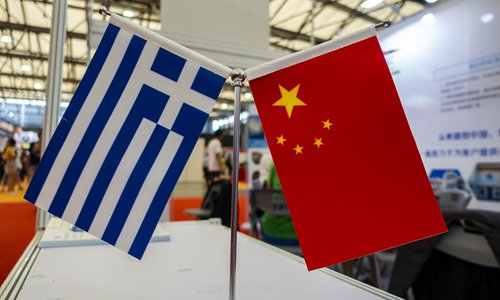China-Greece ties can soothe EU concerns
Source:Global Times Published: 2019/11/10 22:18:39

Photo: IC
Right after Greek Prime Minister Kyriakos Mitsotakis ended his trip to China in early November, Chinese President Xi Jinping embarked on a reciprocal three-day trip to Greece on Sunday. Such high-level exchanges within a short period have drawn widespread attention.
The newly elected Greek government, formed by center-right New Democracy party, is making efforts to attract more foreign investment and promote economic reforms.
There was a time when Europeans were worried Greece could exit the EU due to the debt crisis. Fortunately, Greek economic recovery has stood out.
Cooperation with China has to some extent brought benefit to the country. For example, the Piraeus Port project located in the Athens urban area has received massive investments from the China Ocean Shipping Company (COSCO) and hundreds of local people are working at the port, including administrative staff and employees; only a few Chinese can be spotted.
Greece's economy is still relatively weak now. Economic recovery is the most crucial task for Greece. Boosting ties with China is closely connected with Greek development goals. China's investments in the country have continued to increase during these years and both sides are negotiating new projects. This is not only in the interest of Greece and China but is also in line with EU interests - the bloc would like to see Greece get over its debt crisis and return to the path of healthy development.
However, political figures in Brussels are concerned about China's objective in establishing a cooperation platform with Central and Eastern European (CEE) countries. The 17+1 initiative (China-CEE countries cooperation initiative) is regarded as China's intention to divide and rule the EU. This explains why the EU's policy paper "EU-China - A strategic outlook," released in March, stressed ever more strongly that Europe should speak with one voice when negotiating with China.
Such fear is a reminder to Beijing that when developing cooperation with EU member states, it should make clear in which fields the bloc has exclusive competence and in which areas it shares competence with its member states. This would help promote relations between Beijing and Brussels.
Both the EU and China are highly interdependent on trade and seriously committed to jointly maintaining world peace and sustainable development. The new EU Commission is going to take office before the end of this year. Relations with China will be one of its major priorities. The agreement on the EU-China 2020 Strategic Agenda for Cooperation, which was launched in 2013 and calls for cooperation in the areas of "peace, prosperity, sustainable development and people-to-people exchanges," is due next year. At this point, the two sides need to work together to see how to manage differences and disagreements and how to facilitate cooperation for mutual benefit in the long run.
Both the EU and China attach great importance to Eurasian connectivity and are proactively exploring feasible projects on the continent. The Piraeus Port surpassed the port of Valencia, a major port city in eastern Spain, earlier this year, to become the busiest port in the Mediterranean Sea. The success of Piraeus, in which Chinese investment not only brings economic benefits but also increases local employment, may serve as an example of further cooperation between China and Greece as well as between China and Europe.
The article was compiled by Global Times reporter Li Aixin based on an interview with Men Jing, director of EU-China Research Center, EU International Relations and Diplomacy Studies, College of Europe based in Belgium. liaixin@globaltimes.com.cn
Posted in: VIEWPOINT,CHINA-EUROPE